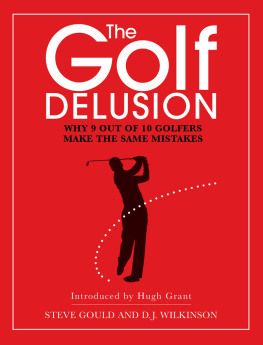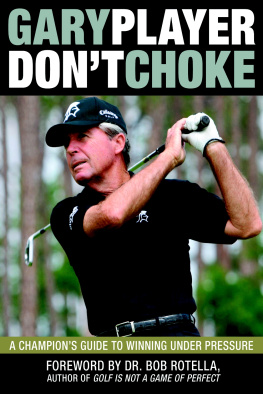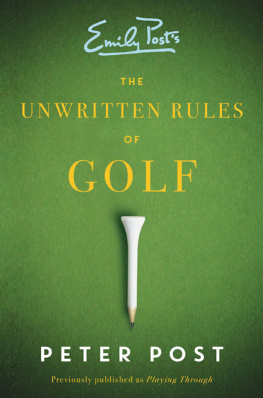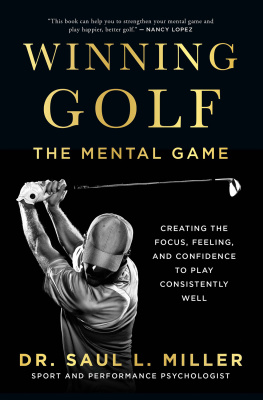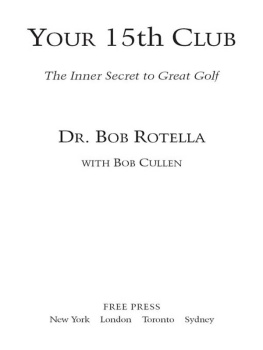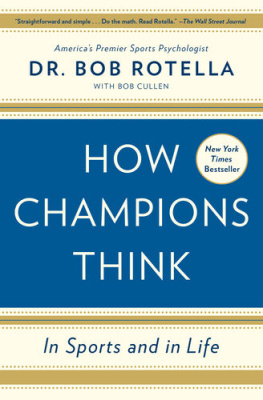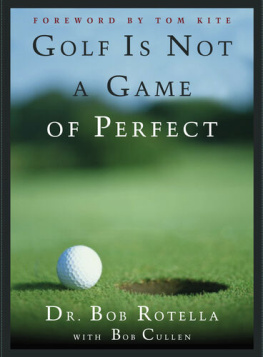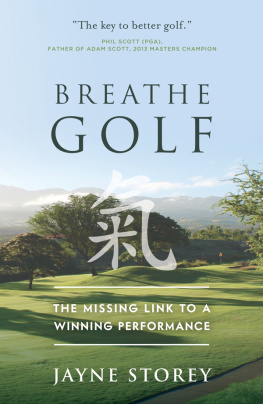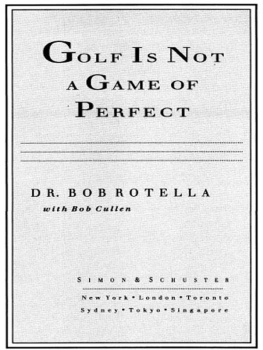ALSO BY ROBIN SIEGER
BOOKS
Silent Mind Golf
Silent Mind Putting
Natural Born Winners
You Can Change Your Life Anytime You Want
42 Days to Wealth, Health and Happiness
Passport to Success
AUDIO
Natural Born Winners
Pathway to Peace of Mind
Pathway to Success
NBW Guided Meditation
GOLF UNDER PRESSURE

Conquer the Choke Point with a Silent Mind

ROBIN SIEGER

First published in 2012
by Aurum Press Ltd, 7477 White Lion Street, London N1 9PF
This eBook edition first published in 2014
Copyright Robin Sieger 2012, 2014
Robin Sieger has asserted his moral right to be identified as the Author of this Work in accordance with the Copyright Designs and Patents Act 1988.
All rights reserved
This eBook is copyright material and must not be copied, reproduced, transferred, distributed, leased, licensed or publicly performed or used in any way except as specifically permitted in writing by the publishers, as allowed under the terms and conditions under which it was purchased or as strictly permitted by applicable copyright law. Any unauthorised distribution or use of this text may be a direct infringement of the authors and publishers rights, and those responsible may be liable in law accordingly
eBook conversion by Quayside Publishing Group
Digital edition: 978-1-78131-165-3
Softcover edition: 978-1-78131-266-7
To Matt Barr, Shaun Macdonald and Mark Ritchie the other members of my perfect fourball
CONTENTS
INTRODUCTION
V ery few professional golfers ever win a major and many never win a pro tournament. Yet, without exception, at some point in their career each has their chance. Even the long-time journeyman and no-hoper will, on one magical Sunday, find themselves in contention, their opportunity to win suddenly at hand. When that day comes they know it, the media know it and the spectators know it. What cannot be known when that life-changing opportunity hinges on just one shot, the shot everyone knows will bring victory if successfully executed, the shot when the player has arrived at their personal moment of truth is the answer to the only question that matters: can they do it?
This moment is what they have dreamt about since they chose golf as their career. They have at last put themselves in a position to win; to do so they must play a critical shot, and execute it perfectly. However, this shot is unlike any other they have played before and as a consequence it takes on a completely new significance: it becomes a defining shot. Make it, they win; blow it and they will probably relive it for years to come. The failure may become a monkey on their back the next time they come into contention, giving rise to unwelcome and unhelpful thoughts of self-doubt.
Golf, like life itself, is a pursuit in which many of the determining factors are played out within the lonely confines of the mind. And, clichd as it may sound, life in turn really is like a game of golf, with the individual doing their best to handle the pressure, the setbacks and the disappointments, in the belief that in the end they will succeed. So when we have the opportunity to win and realise our aspiration, how do we make sure we do not blow it?
Is it something we are born with? Is it the result of a strong mind and immense self-belief? Is it something we can learn, something we can prepare for? Curiously this was a question I found myself pondering after reading a book on military history on a long journey.
In the Second World War, many ordinary members of the public with no military training were conscripted into the armed forces; others volunteered. I became interested in those who not only volunteered (willingly signing up despite the risk of death or injury), but then, once in the services, volunteered again for elite units, with their demanding standards of acceptance and even greater risk of death.
Whilst reading about the early formation of the airborne forces, what really caught my attention was the testimony of a former training instructor of young paratroopers. He recalled that in training there were some stand-out guys, who were fit, motivated, tough as old boots and natural warriors, and there were others, always at the back on the training runs or speed marches, who were anything but natural, were far from the best soldiers, got reprimanded more than others and were often close to being kicked out. The instructors instinctively assumed that when they went into combat the guys who were great in training would be good in action. However, this assumption was repeatedly proven to be false. Often it was the quiet guy, who had been average in training and hadnt stood out, who ended up leading the charge. And in some cases the guy you would have bet your life on, the natural warrior in training, simply froze. This was of course a generalisation, but the notion that, irrespective of what training suggested, you really couldnt predict who would rise to the challenge and who would be overwhelmed by it is a striking one.
It is a recurring theme in accounts of warfare that the soldiers greatest unknown, their greatest fear, was how they would perform when the bullets were real. This horrific baptism of fire would be life or death, not a game or training exercise. Nowhere is the notion that a point in time can provide a dramatic moment of truth, where the individual will either freeze or fight, more apparent.
This ultimate test on the battlefield, I felt, had some clear parallels with people facing their own moments of truth. And my natural inclination was to look for the golfing moment of truth, and try to understand it. But it seemed to me that a better approach to consider than freeze or fight was lose control or take control. I wanted to study those players who had lost control and those who had taken control; how they managed it, or didnt. I was convinced that these insights would go some way to unlocking the mystery of those who perform under pressure and those who choke.
To find our cure we need to be aware of the causes. My primary purpose in writing this book has been to offer some reflections and guidance on the why and the what of choking under pressure. Why do we choke? And what can we do about it? Some of the chapters that follow explore ways in which we can understand the sequence of thoughts and reactions that prevent us from playing at our best. Other chapters will set out specific strategies, instructions and exercises to help us conquer the choke point and play that crucial shot.
When I wrote Silent Mind Golf I described what I believe to be the best possible mental state we need to be in to play our best golf, and what we can do to get ourselves into that state of mind. However, I received the same feedback again and again. Although the Silent Mind approach makes perfect sense, and works on the practice ground, out on the course, in competition, it is much harder to apply, especially at those crucial moments when it is most needed. Pressure was the elephant in the room, and though I had touched on it in my first book, I realised I had to take a closer look at how we might master the pressure shots; the shots that determine who wins and who loses.
There are always factors that are beyond our control. What is within our control is how we train ourselves to react. In that realisation, I believe, lies the key to unlocking the mystery of how to take control when under pressure the key to facing our own moment of truth on the course.
Next page

